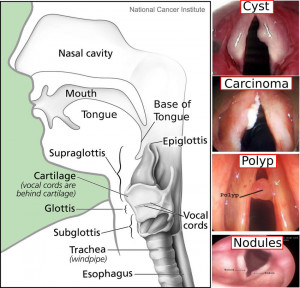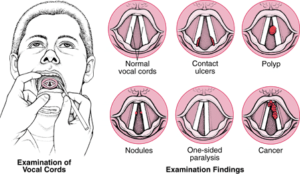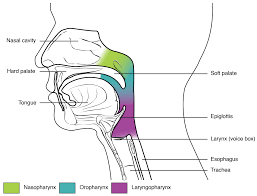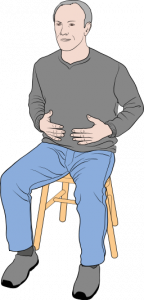Voice disorders in adults
The primary function of the larynx (a.k.a “voice box”) is biological in nature. It acts as a respiratory valve, protects the airways (vocal folds close during swallowing; eliminates food/water entering the lungs by the process of coughing), and helps build lung pressure during physical activity. Larynx sits on top of trachea and consists of vocal folds. The air expelled from the lungs set the vocal folds in vibration creating an acoustic energy, which we call as “voice”.
Different Disorders of voice
When the structure or function of the multiple systems responsible for voice production are affected, they result in perceptual changes commonly labeled as “dysphonia”. For example, voice may be too soft or sound breathy or may be tremulous. Disorders of the voice can be categorized as those that are caused due to inappropriate use (functional), that are due to some damage to the nervous system (neurological), that are due to lesions in/trauma to the laryngeal anatomy (structural), and that are due to infections (systemic).
Some examples of conditions that affect normal voice production:
-
Vocal Fold Nodules: Benign, bilateral localized growths on the vocal folds caused from vocal abuse and misuse behaviors. Voice could be hoarse and/or there may be breaks in voice.
-
Parkinson’s Disease: Neurodegenerative disease that primarily affects motor movements also affects speech and voice. For example, patients may have breathy voice and/or a voice that is too soft.
-
Laryngopharyngeal Reflux: Acid reflux is acid back-flow from the stomach into the esophagus. Long-standing reflux can cause irritation to the laryngeal structures resulting in hoarse voice.
-
Cancer: Laryngeal cancers can be benign or malignant and can occur at the level of vocal folds and above or below them. Depending on the tumor staging, voice symptoms can vary and may require customized treatment plan (e.g., radiotherapy to complete removal of the larynx).
Read a detail blog on Best apps for voice therapy
Risk factors for voice problems :
- The number of years teaching
- High background noise levels in the classroom,
- Experiencing psychological stress while teaching,
- Holding breath while speaking,
- Clenching jaw/teeth while speaking,
- Upper respiratory tract infection,
- Thyroid problems,
- Acid reflux
Read a detail blog on Voice Tips for Teachers
Assessment of Voice Disorders
People experiencing any changes in their voice such as changes in voice quality (e.g., breathy), loudness levels (e.g., difficulty producing a loud voice), pitch levels (e.g., abnormally high/low pitch), tremors, increased effort to produce voice, increased fatigue after talking, pain, and frequent throat clearing/coughing for over a period of two weeks are recommended to visit a physician (ENT specialist) and speech-language pathologist (SLP).
Don’t ignore prolonged symptoms of heartburn or allergies. The role of an ENT specialist is to render medical diagnoses related to the identification of laryngeal pathology and to determine appropriate management strategies (e.g., surgery or referral for voice treatment).
The objective of an SLP is to assess voice production and its underlying physiological function and to determine how the voice disorder affects an individual in everyday situations, as well as to determine prognosis for change, provide recommendations for intervention and support, and recommend referrals where appropriate (American Speech and Hearing Association, 2004).
SLPs use a variety of subjective (e.g., observing tension; listening to the voice) and objective (e.g., recording voice and acoustic analysis) approaches to evaluate voice function.
Download our app to see if your child has a speech delay.
Here are some tips you can keep in mind as you get ready for this year’s music season so that your voice will be in the best possible shape as you get to perform (more tips to read here).
- Know about your vocal system.
- It is important to know what voice machinery you are working with when you sing.
-
- Keeping an awareness of your internal sensations in different parts of your upper body as you sing will help you notice your technique and modify it if needed, and may even help you catch possible issues early on.
- Here is some information about the systems involved in speech or singing, and here is some information about the system that produces voice (phonation). singers voice
- Warm up.
- Like any muscle, vocal folds need to be warmed up before singing to prevent injury.
- You can start with some breathing exercises, do some neck and shoulder stretches, and then move to scales or sustained notes on a vowel or the sound /m/.
- Make sure to move in the lower octaves first, especially if you practice early in the morning
- Pay attention to the way you breathe when you sing.
- Just like talking, singing is done on an exhalation, so your breathing organs play a major role.
- Whether you are seated or standing while singing, it is essential that you breathe into your stomach. Your abdomen should inflate like a balloon on inhalation and deflate on exhaling (i.e. while singing).
-
- As Saint Thyagaraja has famously said, “…Naabhi Hrudh Kanta Rasanaa Naasaa adula andu Sobhillu Saptaswara…” Airflow while singing the seven notes should rise up from your “Naabhi” (navel), to your “Hrudh” (heart or chest), to your “Kanta” (throat), to your “Rasanaa” (tongue/mouth) and your “Naasaa” (nose) and beyond. singers voice
-
- Also, your shoulders must never rise or tense up when you sing-you can practice singing in front of a mirror to check. This is to maximize breathing efficiency and also to make sure you are not putting outside tension on your vocal cords from your shoulders.
- Be mindful about clothing choices.
- This may seem trivial, but a tight waistband, dhothi, Saree, or blouse can restrict breathing and this does not bode well for breath control!
- Keep your head, neck, and upper body relaxed but erect.
- Don’t move your head or neck up/down when moving between low or high notes. This does not help your larynx change pitch at all, and may even cause undue strain on the surrounding muscles.
- Don’t look down at lyrics while singing. This also adds external strain.
- Make sure your microphone, if present, is also at the correct height for you to look straight as you sing.
- Stay hydrated.
- This is fairly common knowledge, but water is extremely important.
- Keep taking frequent sips every 20-30 minutes if possible, rather than downing large amounts at distant intervals,
- The water does not have to be extremely hot-anywhere between room temperature to tolerably warm is sufficient.
- Coffee is actually a dehydrating agent, so it is no substitute for water.
Read a detail blog here Tips for Classical Singers
Treatment for Voice Disorders in adults
Although a specific treatment plan will be formulated by your SLP, you can care for your voice by following some of these do’s and don’ts.
Voice disorder Problem,
|
DON’T Push your vocal system |
DOIdentify & Eliminate Vocally Demanding Behaviours |
|
Use non-vocal sounds (e.g., whistling), noise or instruments (e.g., clapping; blowing a horn) |
|
2) Avoid talking in noisy situations: over loud music: e.g., at noisy parties; in cars/ buses; over noisy machinery, heavy equipment, or motors, etc. Don’t talk over a long distance, especially outside. |
Adjust your environment as much as possible to reduce background noise. Position yourself as close as possible to people you are talking with, especially when there is competing noise. Always face the person(s) you are talking to.
|
|
3) Don’t try to lecture, or speak to large audiences without the aid of a microphone |
Use a microphone for public speaking Practice microphone technique: keep your voice relaxed, and at a comfortable level and let the microphone amplify your voice |
|
4) Don’t expose you voice to excessive pollution: cigarette smoke, chemical fumes, etc. – Avoid smoking. – Don’t drink alcohol excessively. – Avoid coffee, tea, sodas |
Drink plenty of water daily (64 oz) |
|
5) Don’t clear your throat frequently. |
Swallow slowly Drink water |
Limit amount of talking when you have a cold or feel tired. Be aware of your reflux symptoms and medications. Limit intake of spicy, acidic, and fatty foods and sleeping within 3 hours of eating dinner.
Tips for encouraging good vocal hygiene:
Excessive yelling or shouting is considered ‘vocal abuse’. Begin to be aware of the loudness of your voice in different situations (e.g. when talking to a peer, or a family or in larger gatherings). Monitor your loudness to suit the situation. Try to stop the use of loud voices too often or for long durations of time.
- A regular habit of smoking can cause irritation to the vocal cords. Giving up smoking is ideal for good vocal cords and voice.
- Ensure that you are hydrated throughout the day. Take sips of water regularly. Try to replace caffeine (including soda, coffee etc.) with water as often as possible. This will ensure hydration of the vocal cords.
- Every individual has a specific pitch (of their voice) which is ideal for their vocal system. It is best to use that ‘ideal’ pitch while talking. Consistently talking in a pitch that is too high or low can affect the voice box. Find your ideal voice (if needed with help from a speech therapist) and make it habitual.
- Are you consistently clearing your throat? Doing that too often can cause annoyance to the vocal cords. Reduce the habit, as far as possible. Try to clear the throat, at first, by drinking water. If that does not help, clear it by humming gently.
- If your profession demands you to use your voice often, take some voice ‘breaks’ from time to time. These are short duration breaks, (e.g. between lectures/ classes), wherein the voice is rested. This will help take care of the voice and make sure it does not tire.
- Being aware when the voice ‘tires’ or ‘is not sounding its best’ is important. If the vocal cords are irritated, the voice may tire / become harsh to hear, throat may pain while speaking or the voice may lose its loudness. These are all indicators that it needs extra care. Resting the voice (‘voice rest’) is important to begin with. If the issue persists, seeking of professional help is important.
- If the voice is irritated due to inflammation such as during laryngitis. Take the (voice) rest that is needed. Follow the prescribed medication, if any, and drink a lot of fluids. Many a times we may skip the time for relaxation due to an overwhelming schedule, but that can prolong the recovery and may cause further complications.
- Few medical issues – such as gastric reflux, allergies or asthma – can affect the vocal system. Seek advice of a physician early on to eliminate or treat these conditions before they begin to affect the voice.
- Limiting self-medication is vital. Few medicines may aggravate or irritate–the throat, vocal system and cords. Seek proper medical advice and take prescribed medication, as far as possible.
Book your voice therapy sessions now




